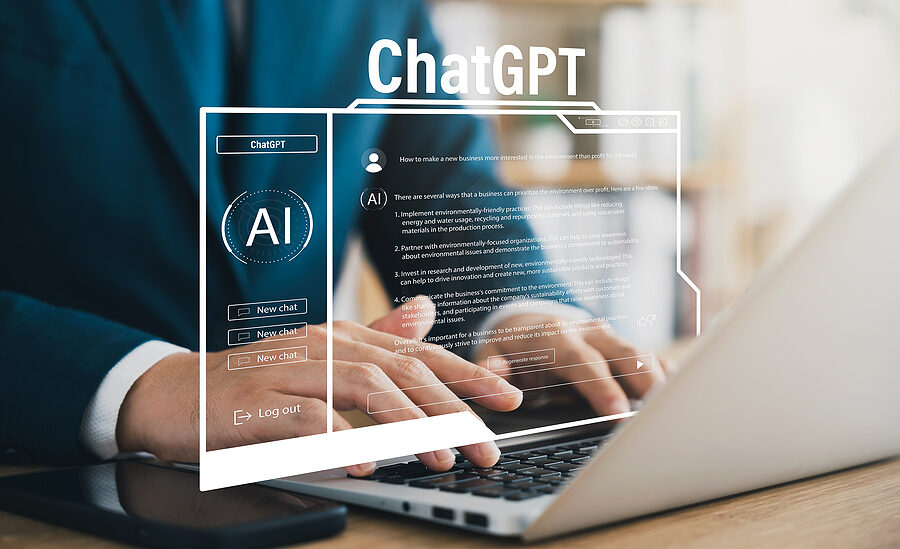-
Latin America had a total of 303 million visits to ChatGPT this year.
-
As AI tools become more widespread, they could potentially raise global GDP by 7%, or nearly $7 trillion, and increase productivity growth by 1.5 percentage points over 10 years, as per Goldman Sachs Research.
Artificial Intelligence ( AI ) has captured the attention of the world this year and could potentially have a significant financial impact on the global economy, according to Goldman Sachs Investment Banking, which indicated that it could attract up to $200 billion by 2025 from a global perspective.
It’s like a tsunami sweeping across the planet, and most want to catch the big wave. However, warnings about its potential to have a major impact on humanity have been issued, with claims that it poses a threat to national security. According to data from Goldman Sachs economists, AI could affect 300 million jobs globally.
This is not the first nor the last time that humanity faces the paradox of incorporating the benefits of new technologies and dealing with their side effects. In the current context, workforce reallocation is much more challenging and depends directly on the educational level and training of the country.
Regarding the ChatGPT system, it positions itself as the fastest-growing application in history. It was launched in November 2022 and had 100 million registered users per day in its first month. According to Bloomberg, Latin America had a total of 303 million visits to ChatGPT this year, divided as follows: Brazil 2.2%, Colombia 1.9%, Mexico 1.7%, Chile 0.72%, Argentina 0.71%, Peru 0.71%, Ecuador 0.7%, and the Dominican Republic 0.4%. Brazil ranks as the tenth country that uses it the most, followed by Colombia at 14th, and Mexico at 16th. These visits are mostly from users aged 18 to 34, predominantly male profiles.
Generative AI models (GenAI), like ChatGPT, seem to spark a heated debate about their potential to transform our daily lives. But what about the business environment? How can this technology be leveraged?
“The evolution of generative artificial intelligence is happening rapidly, and companies that don’t adapt in time will undoubtedly fall behind. It would be ideal for organizations to embrace this advanced technology rather than reject it. However, this doesn’t mean that a one-size-fits-all solution is appropriate for all when it comes to GenAI models,” explains Alejandro Luna, Country Manager of Infor Mexico.
Although Generative AI, which is nothing but generating original content such as texts and images from existing data, is still quite nascent, we are at an inflection point. Natural language processing (NLP), which aims to make machines understand and manipulate human language, is causing a sensation. In many sectors, these GenAI models can help facilitate information retrieval for users and provide company-wide search capabilities based on natural language processing (NLP) of business data, extending into the realm of AI and giving computers the ability to understand text and spoken words in the same way humans do.
As these tools gain ground in businesses and society, they could potentially drive a 7% increase, or nearly $7 trillion, in global GDP and boost productivity growth by 1.5 percentage points over a 10-year period, according to Goldman Sachs Research.
However, even though AI may impact millions of jobs, the replacement of humans by machines only occurs where repetitive and low-complexity tasks exist. A job that involves creativity, critical and strategic thinking, analytical perspective, empathy, and ethics won’t be eliminated. In fact, this kind of work will be optimized with the support of generative AI, offering solutions with high speed, quality, and depth, as far as the user’s capabilities allow.
It’s impossible to think that technology alone, based on data, could capture the idioms and dialects of Mexico through the text and audio data it obtains, so that it can be understood by processing engines. There are chatbot platforms that understand the meaning of colloquial language in some regions. However, what’s interesting about this technology is analyzing the future challenges this landscape poses. That’s why Infor took on the task of classifying them:
GenAI in Action and Future Challenges
Companies needing to create their specific language models must be attentive to three main risks:
- Reliability: although content generated from a large linguistic model seems original, it’s actually imitating a pattern based on a training data set similar to what it has been exposed to. Often, false information can be generated with the same question, resulting in different answers.
- Privacy: the data and conditions users share are used to train the larger model. Generating and exchanging specific business content must comply with strict legal and data privacy requirements; for instance, when companies conduct a Data Protection Impact Assessment (DPIA), they must ensure compliance with the General Data Protection Regulation (GDPR).
- Bias: AI-generated content is tailored based on the input request. The model can also be trained using only favorable data points without exposing it to the complete picture. Ultimately, it can shape the outcome in whichever way it desires, both beneficial and detrimental.
These challenges are not insurmountable
One way to combat these threats is to apply appropriate moderation filters in the end-user interface. Certainly, for business use, a “human in the loop” approach must be followed, meaning all generated content must be guided by a real person before being deployed for regular consumption. Human control and moderation will be necessary for some time to enhance the accuracy and coherence of generated content, help reduce socio-political biases, and ensure a company’s competitive advantage remains uncompromised.
“It’s important to understand that cloud solutions developed to support enterprise AI are a supplement to operations,” explained Alejandro Luna. “At Infor, we are prepared for this. Our customers don’t need to invest in hiring data specialists since they can rely on the SaaS solution offered by the team and receive full support,” added Infor’s Country Manager in Mexico.
Rapid Evolution of GenAI
It’s evident that over the next five to ten years, investments in technology will increase significantly, both in terms of generating better models and in the hardware space, with faster and more powerful chips and the need for more network bandwidth. “Its impact shouldn’t be underestimated. All the multimedia content we’ll consume in the coming years will be influenced by GenAI; internet searches, as we know them, will lean towards a personalized and conversational experience; tools detecting AI-generated content will become smarter, and regulations and compliance will become stricter,” concludes the Infor executive.
ChatGPT and other GenAI models represent disruptive solutions that are already helping consumers refine the search process, automate content creation, and boost individual productivity. While we expect companies to quickly adopt this powerful technology, we also anticipate they’ll be aware of potential risks, inaccuracies, and privacy concerns it brings. Naturally, it’s only a matter of time before the GenAI space matures and addresses these concerns.












